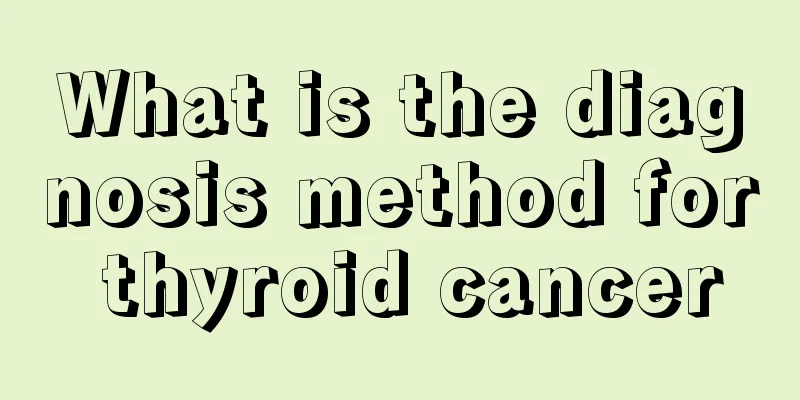What is the diagnosis method for thyroid cancer

|
What is the diagnosis method for thyroid cancer? The more you know about the disease, the more comfortable you will be in treating it. This is especially true for a disease like thyroid cancer. Accumulating some common knowledge about thyroid cancer can ensure timely discovery of the disease. The diagnosis method is extremely critical in treatment. So what is the diagnosis method for thyroid cancer? Single or multiple nodules on one or both sides of the thyroid gland, with a smooth surface, soft texture, no tenderness, and large mobility when swallowing. The cyst has high tension and may also appear hard. Thyroid isotope scanning, B-mode ultrasound examination, etc. can help with diagnosis. If differentiation is still difficult, puncture for cytology examination can be performed. Differential Diagnosis The above examinations can be used to differentiate differentiated thyroid cancer from nodular goiter, subacute thyroiditis, chronic lymphocytic thyroiditis and sclerosing thyroiditis. Thyroid adenoma: caused by thyroid adenoma or multiple colloid nodules. Single or multiple, can coexist with goiter or appear alone. Adenoma is generally round or oval, and its texture is mostly harder than the surrounding thyroid tissue. There is no tenderness. The scan shows that the uptake function is normal, increased or decreased; thyroid imaging is "warm nodule", "hot nodule" and "cold nodule" respectively. The thyroid uptake rate can be normal or high. The tumor develops slowly and is mostly asymptomatic clinically, but some patients have symptoms of hyperfunction. Simple goiter: the most common cause of nodular goiter. The medical history is generally long, and it often grows gradually without being noticed, and is discovered accidentally during a physical examination. Nodules develop during the process of glandular proliferation and compensation. Most of them are multi-nodular goiters, and a few are single nodules. Most nodules are colloid, and some of them form cysts due to bleeding and necrosis; patients with long-term illness may have more fibrosis or calcification, or even ossification in some areas. Due to the different pathological properties of nodules, their size, hardness, and appearance vary. Thyroid bleeding often has a history of sudden swelling and pain, and there are cystic masses in the gland; those with colloid nodules have a harder texture; those with calcification and ossification have a hard texture. By reading the article, we can understand some of the diagnosis methods of thyroid cancer. Knowing these can help us diagnose and treat the disease in time and avoid missing the best time for treatment. In recent years, many people are very likely to develop thyroid cancer. Knowing more about your condition is very helpful for recovery. |
<<: What are the key points in diagnosing thyroid cancer?
>>: What tests do you need to do if you have thyroid cancer
Recommend
How to make nails grow quickly
Nowadays, many girls who love beauty will choose ...
What are the dietary taboos for ovarian cancer
Ovarian cancer is the disease that women fear the...
When is the best time to brush your teeth?
We have to brush our teeth every day since we wer...
The most common symptoms of bladder cancer
Bladder cancer is a type of cancer. Most people w...
The brain is slow to react
Nowadays, whether you are an office worker or a s...
A patch of hair fell out in the middle
Metabolism occurs in every cell and organ of the ...
What to do if a one-year-old baby is calcium deficient
Babies are the apple of every mother's eye. M...
Is papillary thyroid microcarcinoma serious? How to treat papillary thyroid microcarcinoma
There are many types of cancer. Many people die b...
Postoperative complications of pyloric stenosis
Pyloric stenosis mostly occurs in infants. If the...
Can you eat dead flower crabs?
There are many types of crabs in daily life. Flow...
How does thyroid cancer cause a slower heartbeat?
Thyroid cancer is a malignant tumor originating f...
How to recover from disc bulging?
The intervertebral disc is a component of the spi...
Can breast cancer be cured by two negative and one positive dual targets
Can breast cancer be cured by dual-target therapy...
Can hepatocellular carcinoma be cured?
Can hepatocellular carcinoma be cured? 1. Hepatoc...
How much does a brain cancer check cost
The issue of hospital examinations and drug charg...









